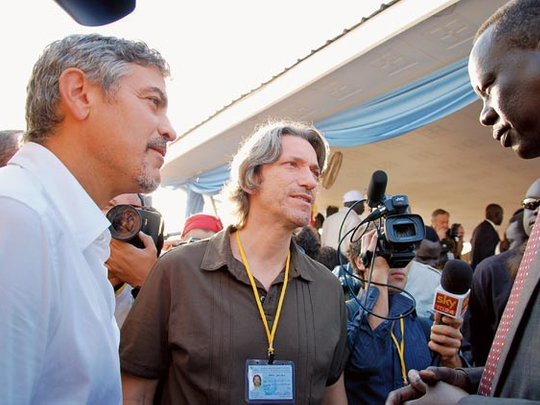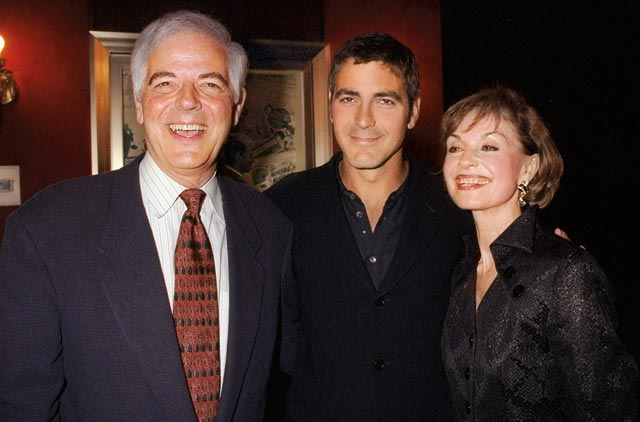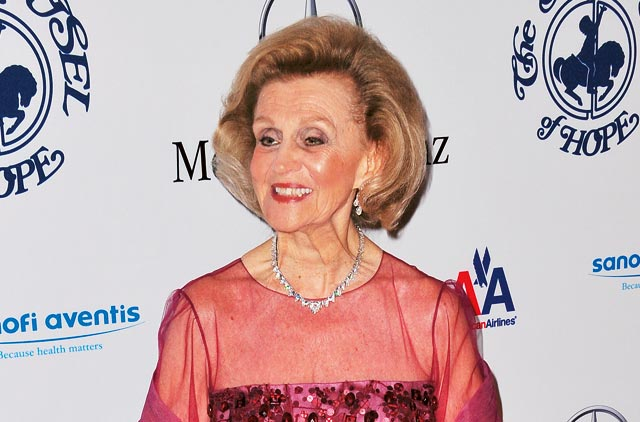
George Clooney’s time is split between acting, directing and producing. He’s also devoted to charity work but has to pick and choose carefully how to make the most of his limited time. Every two years, socialite and philanthropist Barbara Davis gets on the phone with the crème de la crème of Hollywood to promote her coveted philanthropic Carousel of Hope Ball – and no one ever turns her down. From George Clooney to Tom Cruise and Barbra Streisand then and now, they still come.
It’s an event that rivals the Oscars – the legendary fete has raised more than $75 million in the past 35 years for the octogenarian’s two personal causes, the Children’s Diabetes Foundation and the Barbara Davis Center for Childhood Diabetes, both established in Denver after she and her late husband, billionaire businessman and one-time 20th Century Fox owner Marvin Davis, discovered their daughter Dana had childhood diabetes.
“The Carousel of Hope Ball is a real testament to Barbara,” Clooney says. “She’s able to really put together a great group of people who all love her. Obviously, a big part of this is that you don’t want to disappoint her. She works so hard at this, and she’s really good at it.
“And I really care about her. She’s a really nice, smart, hardworking woman who I believe very much in.”
Clooney will be on hand to keep Variety’s Philanthropist of the Year happy (and accept a coveted Brass Ring Award for “unprecedented humanitarian undertakings”) at Davis’ gala on October 20 at the Beverly Hilton.
Arguably the biggest philanthropic event held in Hollywood, Davis’ bash always draws A-list celebrities and power players from every era, as 2012’s “blue ribbon committee” proves, boasting classic names like Sidney Poitier, Scarlett Johansson, CBS President and Chief Executive Officer Leslie Moonves, CEO of Paramount Pictures Brad Grey, and Denzel Washington among others. The A Listers re-arrange their schedules just to attend. We talk to George about the Hope Ball and why raising funds for charity is so close to his heart:
You must get requests to be involved in so many causes. Why the Carousel Ball?
I do get a lot of requests, but in general I find that I don’t want that. For a number of reasons. One is, it’s too much. I understand why they want me to come, often it has less to do with you and more that it calls attention to their cause. I understand all of that, we’re all grown ups, I understand how it works, but you don’t want to do it. And it can be embarrassing at times. But this is one that I looked at and said, well this is one that she does every two years. It’s a big event for her. She works so hard at this, and she’s really good at it. And I really care about her. She’s a really nice, smart, hardworking woman who I believe very much in. So I felt that too, she stepped up for me when we were working on Haiti, so I feel an obligation to step up for her, too.
You mentioned your Haiti Telethon. What it’s like to put a benefit telethon together?
The Haiti telethon [to help those affected by the Haiti earthquake in 2010] was one of those things that had to happen so quickly. We had it up and running in a week [it raised over
$58 million, which went towards the Hope for Haiti Now charities]. And it was very hard to do all the things they needed. One of those things is that you need some of the people who do this really well to help out. So I called Barbara and talked to her about it, and she was incredibly helpful. And she immediately thought, ‘Well, let me see what I can do for Haiti.’ And she has a big heart. She’s just a lovely woman, very open and fun, and she’s not uptight at all.
What’s your take on donating money to these things?
I think it’s a personal decision. I’ve been broke as long as I’ve been well off in my life. But often with my parents on Christmas day we had to go to some stranger’s house, to people that were less well off than we were – and we weren’t well off – and make sure that they had a Christmas that morning. It was part of how I was raised, that no matter where you are, there’s always somebody who has it worse, and that you have to look out for the people who are on the next rung down, just to give them a helping hand. And so I find that the position I am in now gives me a tremendous amount of access and ability. But the responsibility is something that is either born in you or not, and it is something that either you do or you don’t. I don’t try to guilt people into doing it, I just feel like people do what they can do. I just happen to find it such a waste of time if you didn’t contribute to the people who didn’t catch the brass ring [which is given away at Variety’s Philanthropist of the Year for “unprecedented humanitarian undertakings”] – which I happened to about 15 years ago.
You’ve been to the Carousel Ball once before. Do you remember what that was like for you?
It was many years ago, probably 1995 or 1996 right after ER hit, and I was really intimidated by it. Everybody was a big star, and I had been famous for about five minutes at that point. I was very intimidated by how many famous faces were there. I didn’t feel completely comfortable. Everybody looked very nice and they all seemed to be having a really nice time and I think I found that very exciting and exhilarating, as an actor who hadn’t really been in that kind of a crowd before. I hadn’t gone to any of those other events then, I had never been to the Oscars, never been to the Met Ball – I don’t think that even existed when I went to the Carousel of Hope – so for me, that was the biggest event I had ever been to, so I was very impressed by it.
Economics must play havoc with anybody’s ability to raise money?
For periods of time, it goes completely haywire. It gets almost impossible to raise money. But this is all cyclical. There have been how many downturns, since 1929? We continue to have these things, and they do bounce back. And what I always find amazing is how quickly people are able to find room in their hearts to make way for other people, people that they don’t know at all. I think that yes, a downturn always, obviously, makes it difficult. It’s difficult on everybody, so it is certainly difficult on charitable organisations, because you have to take care of yourself and your own family, when there is a downturn. But I am always surprised at how we do. When we did the Haiti telethon, things weren’t going very well in the economy and people really stepped up. We made a lot of money for those people and took care of a lot of very, very needy people... the one thing that we don’t have in America, yes, things are tough and we’ve had some very tough times lately, but there’s nothing compared to the kind of poverty that you see in these places. An entire society in need, like we saw in Haiti or like Somalia was. [George has been championing the humanitarian crisis due to the conflict between Sudan and south Sudan. One of the world’s poorest regions, it has hardly any roads, railways, schools or clinics as a result of two decades of conflict.] When you go to the Sudan or Chad [where civil unrest has left over 2.5 million people homeless] and you see what these people are trying to live through, we’re not starving to death here. We’re having a very tough time, but it is a lot worse in other places. And I think people recognize that. That’s what I love, that’s what I am most proud of, as an ambassador of the United States.
What is the one cause that you continue to be involved in?
The Sudan is a big one. I have a satellite that I keep in the air and keep taking pictures of [the country to monitor the situation]. That’s very expensive to do, but it’s incredibly effective, so I have to continue to do it. So in doing that, that means I have to do things like, every couple of months I have to go somewhere and do a speaking engagement to keep funding the satellite. Then also every day I get briefings on what’s going on, what we’ve gathered intelligence-wise, what other news agencies have gathered on their own, what the UN has, and then we have to sort of balance it all. If I have a skill in this, it is being media savvy, especially being the son of a newsman [Nicholas Joseph Clooney, American journalist, anchorman, and television host]. So understanding how news stories develop and how they last, and their cycle. And understanding that you can’t just beat the drum about the people in the mountains that are being summarily murdered. You can’t beat that drum 24 hours a day, seven days a week, because it falls off the radar too quickly. So it is about constantly being aware of what is happening around you and taking evasive action if needed well in time.
How much of your life is devoted to raising awareness and being part of trying to end the conflict in the Sudan?
I probably devote a couple of hours a day to it. I’ve really learned that you have to focus as much as you can on specifics, so that you can inform yourself. You have to go there, you have to spend time there. I spent ten days there a couple of months ago, in the Nuba Mountains, and it was a very difficult place to be. And I had a really rough time coming home from it. You feel a tremendous responsibility to tell these people’s stories, the stories of the people who are being killed. You also have a healthy amount of adrenaline going through you the whole time, as you are also trying to make sure you don’t get yourself killed along the way.
The Carousel Ball is considered quite an event. Barbara Davis really seems to care. And a big part of the Hollywood community is always supporting her.
It’s a real testament to her. She’s able to really put together a great group of people who all love her. Obviously, a big part of this is that you don’t want to disappoint her. She really does pay attention to things that matter in the world. For whatever reason, one of the right people in the world got rich! That’s a good thing. It’s good when that happens.













